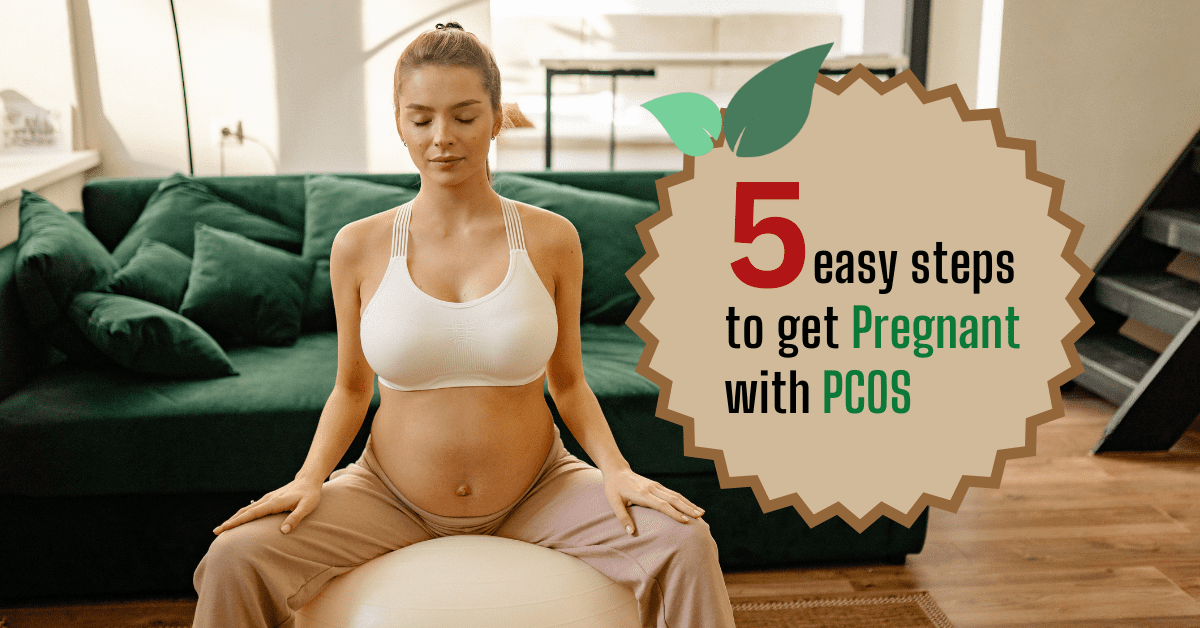People Usually tensed and want to confirm Can I Get Pregnant with PCOS? So, Getting pregnant with Polycystic Ovary Syndrome-PCOS can be a bit hard but not impossible. With the help of the right support, lifestyle changes, and medical interventions, it is entirely possible to conceive easily with PCOS.
It is estimated that between 5% and 10% of women of childbearing age have Polycystic ovary syndrome.
How to Get Pregnant with PCOS Naturally
Polycystic ovary syndrome (PCOS) is a condition in which a woman’s hormones are out of balance. It affects hormones and can interfere with ovulation, which is necessary for pregnancy. If not treated on time, Polycystic ovary syndrome can cause infertility and other severe health issues.
Polycystic ovary syndrome can have severe consequences for fertility, so women need to be aware of the signs and symptoms of PCOS.
Also Read: PCOS Causes
For instance, signs of PCOS (Polycystic Ovary Syndrome) may include irregular or absent menstrual periods, excessive hair growth on the face and body, and difficulty getting pregnant. Having a Polycystic ovary doesn’t mean you will never be able to get pregnant.
However, with the help of medication and lifestyle changes, women with Polycystic Ovary Syndrome can still get pregnant.
Women with Polycystic Ovary Syndrome can help their odds of conceiving by tracking their menstrual cycle, eating a balanced diet, and meditating to reduce stress.
Making these lifestyle changes can help to regulate hormone levels and improve fertility. Medications like clomiphene can also boost ovulation and help you get pregnant.
(Note: Get a prescription from a medical professional before taking any medications without their prior knowledge.)
Also Read: PCOD vs PCOS
Steps for easy conceiving:

Women with PCOS (Polycystic ovary syndrome) should take some of the same precautions that other women generally take to ensure a healthy pregnancy.
- Keep a healthy weight
Growing weight is directly connected with the condition of Polycystic Ovary Syndrome. However, many females with polycystic ovary syndrome are not obese at all.
Despite being slim or fat, you can improve your fertility and reduce the symptoms of PCOS by maintaining a healthy body weight.
Keeping a healthy and active lifestyle can greatly contribute to treating your healthy fertility.
Walk 5,000 to 10,000 steps daily, use standing desks to cope with your sedentary lifestyle, and lift light weights. These small steps can help with preventing major symptoms and will improve your overall health.
- Healthy Eating

Eating a balanced diet, rich in fruits and vegetables, is essential to manage PCOS (Polycystic ovary syndrome) symptoms and promoting overall health.
This is like filling up a car with the right fuel. You can’t expect it to run optimally if you put the wrong energy into it, and the same is true for a person’s body – you can’t expect it to function correctly without the right fuel.
Specific vitamins and minerals are essential for a healthy pregnancy and the baby’s growth. Consult your doctor to determine which supplements are right for you.
The following dietary supplements could improve fertility:
- Vitamin B12
- Vitamin B9 (folic acid)
- Vitamin B6
- Vitamin C, D, and E
- Managing Blood Sugar Levels
Blood sugar levels must be controlled to prevent symptoms and complications of PCOS. It can change how the body uses insulin, making it more challenging for it to do its job. Type 2 diabetes or high blood sugar levels can sometimes arise from this condition, which further leads to fertility issues.
Eating a more fiber-rich, protein-rich, and healthy-fat-rich diet will help the body use insulin effectively. Regularly working out and keeping a healthy lifestyle will prevent PCOS signs and other health issues.
Follow: PCOS Diet Plan
- Medicinal Treatment
Your doctor might prescribe medication that will help you in conceiving.
A few medications that support fertility are:
- Clomiphene and letrozole (Femara): It stimulates a series of steps that trigger ovulation
- Gonadotropin shots (injection of hormones)
- Metformin (to manage blood sugar levels)
- Fertility Treatment

You might have been recommended to have IVF if your medications aren’t working for Polycystic ovary syndrome (PCOS). This involves removing eggs from the ovaries and fertilizing them outside the womb. The fertilized egg or eggs are then restored in the uterus.
If you have Polycystic ovary syndrome, IVF will increase your chances of conceiving twins or triplets.
Before considering IVF, your doctor may recommend a less expensive treatment which is Intrauterine Insemination (IUI).
It involves injecting high concentrations of sperm close to the egg to increase the chances to get pregnant with PCOS (Polycystic Ovary Syndrome).


